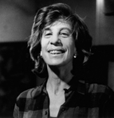
As a producer/director, Jill Godmilow has earned a substantial reputation
during more than four decades of film and video making. Considered one of
the primary theoreticians/practitioners in the American non-fiction genre,
she has been interviewed in American Film, Afterimage, In
These Times, The Independent, History and Theory, Text
Performance Quarterly and featured in international festivals since
1973. Her 1971 TALES (made with Cassandra Gerstein and an all-female crew)
is a "performed documentary" about how we tell stories about sexual
experiences, which Jonas Mekas called the most interesting film in the Whitney
Museum's "New American Filmmakers Series" that year. Her ANTONIA:
A PORTRAIT OF THE WOMAN, (co-directed with folksinger Judy Collins in 1973)
was the first independently produced American documentary to enjoy extensive
theatrical exhibition in the United States and broadcast in eleven foreign
countries. Among other honors, it received an Academy Award nomination and
the Independent New York Film Critics Award, "Best Documentary".
Most of Godmilow's productions are in the realm of non-fiction, including
NEVELSON IN PROCESS, a portrait of the sculptress, Louise Nevelson, and
THE ODYSSEY TAPES, about Richard Dyer-Bennett's 24 hour performance of Homer's
"Odyssey". With the Ethnic Art Center, she produced and directed
THE POPOVICH BROTHERS OF SOUTH CHICAGO, the story of a family of Serbian-American
musicians in South Chicago, and for the producers Chiquita and Andre Gregory,
she directed THE VIGIL, a study of the para-theatrical work of the acclaimed
Polish company "Teatr Laboratorium", and AT NIENADOWKA WITH GROTOWSKI,
on the work of Polish theater director, Jerzy Grotowski.
In 1984, her non-fiction feature, FAR FROM POLAND, about the contradictions
of the Polish Solidarity movement, was heralded for breaking new ground
in the documentary genre. Its radical deconstructive approach and juxtaposition
of fact and fiction led directly to the genesis of her dramatic feature
film, WAITING FOR THE MOON, a feminist/modernist "fiction" about
the lives of the famous literary couple, Alice B. Toklas and Gertrude Stein,
(played by Academy Award winner, Linda Hunt, and British stage actress,
Linda Bassett). WAITING FOR THE MOON was produced for PBS's "American
Playhouse" series and released theatrically by Skouras Pictures. It
was honored at numerous national and international film festivals (First
Prize at the Sundance Film Festival) and enjoyed broadcast and theatrical
distribution in France, Germany, England, Australia, Sweden and Japan.
In 1995, she directed the feature-length ROY COHN/JACK SMITH - a film which
re-interprets Ron Vawter's famous theatre piece on the closeted and uncloseted
lives-in-performance of two radically opposed and infamous queer men, both
of whom died of AIDS in the late 1980's. The film was featured at the Toronto,
Berlin, Melbourne, Sydney, Montreal, Jerusalem, and Galway film festivals.
In 1998 at the Rotterdam Film Festival she premiered WHAT FAROCKI TAUGHT
- a short work which contains, in her own words, "a stubborn, perfect
replica", in color, in English, of Harun Farocki's astute 1969 b/w
German film, "Inextinguishable Fire" - about the production of
Napalm B by Dow Chemical for Vietnam, about the abuses of human labor, and
about documentary filmmaking. In the U.S., the film has screened at the
Big Muddy, Ann Arbor, Athens, Carolina and Vancouver Film Festivals, and
in Europe, at Rotterdam, Oberhausen, Locarno and at CONSTANT in Brussels. In 2002, she released the three disc, six hour DVD, LEAR ’87 ARCHIVE
(CONDENSED), about the New York theatrical collaborative, Mabou Mines, in
rehearsal on a fully gender-reversed production of “King Lear”, directed by Lee
Breuer with Ruth Maleczech in the leading role.
Then, with two Polish friends, Joanna Krakowska and Magda Mosiewicz, she made an
exact replica, in Polish, of a 1976 French film, SCUM Manifesto, which enacts the text
of Valerie Solanas' 1967 famous feminist manifesto. Why? Because neither Solanas'
text not the French 1976 film were available in Poland.
More recently, in 2019, she made a short, animated film, On the Domestication of
Sheep. Here I take up the subject of the domestication of wild animals and meat
production, processes that industrialize them for our consumption and erase the lost
animals’ lives... in this case, the lives of sheep.
![]()